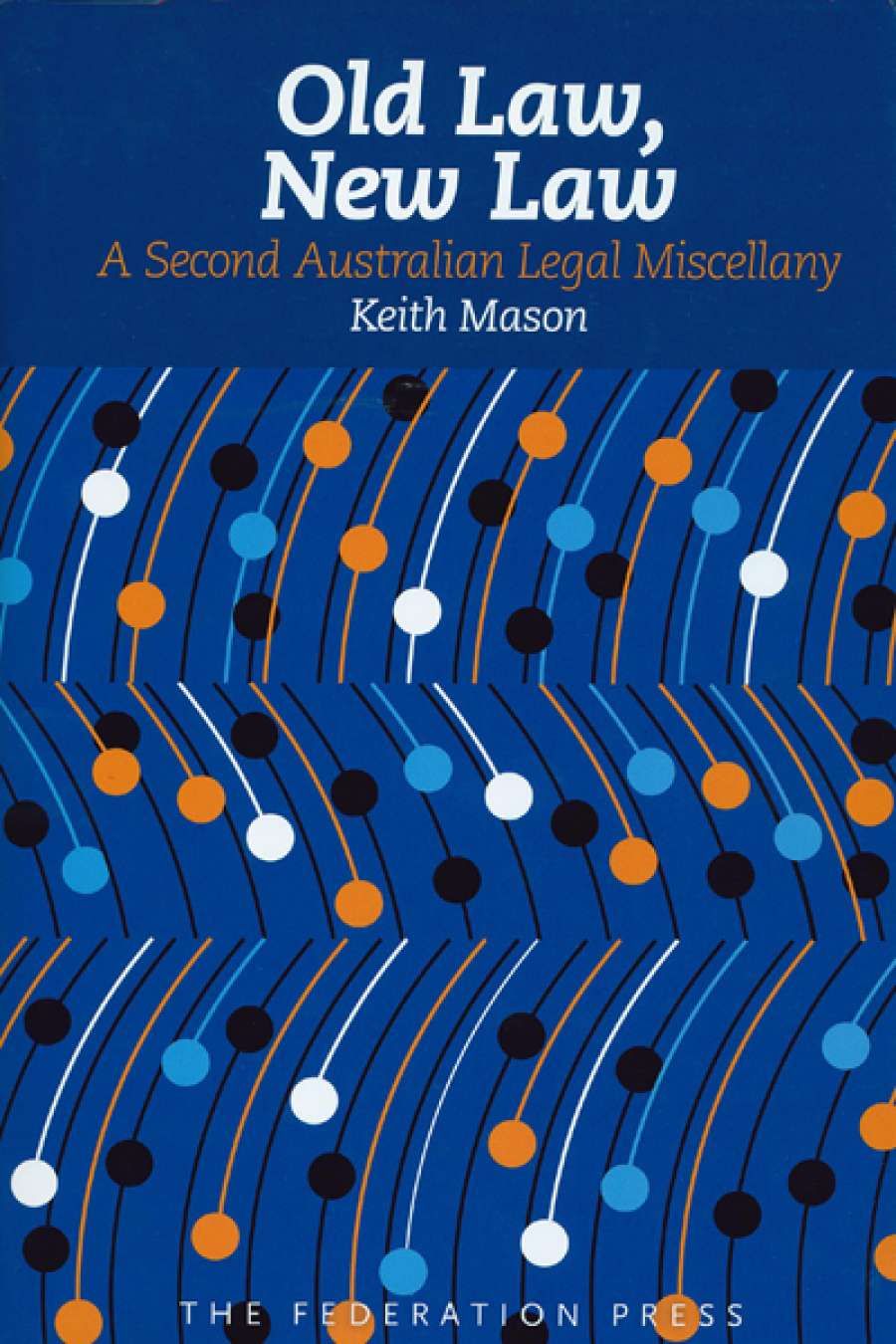
- Free Article: No
- Contents Category: Law
- Custom Article Title: Peter Heerey reviews 'Old Law, New Law' by Keith Mason
- Book 1 Title: Old Law, New Law
- Book 1 Subtitle: A Second Australian Legal Miscellany
- Book 1 Biblio: The Federation Press, $59.95 hb, 208 pp, 9781862879751
There are valuable vignettes of important episodes in Australian history which perhaps have faded from general awareness. These include the Rum Rebellion, the only military coup in Australian history, and the Egon Kisch saga.
Kisch was a Jewish Czech communist invited to visit Australia by anti-fascist organisations in 1934. He reached Melbourne on the Strathaird, but the captain, at the request of the Immigration Department, detained him on board. Kisch, as Mason says, ‘literally jumped ship … in the presence of a large crowd of enthusiastic supporters, falling six metres and breaking his leg’. (A side issue of the affair is that it became a prolific pun generator. Kisch wrote a book about his adventures entitled Australian Landfall (1937), and Mason speaks of Kisch being subsequently granted bail by a Sydney court ‘over the protests of the prosecution that argued (contrary to the laws of gravity) that the ship-jumping showed him to be a flight risk’.)
Finally, the Commonwealth Government hit on the tactic of giving Kisch a dictation test under the Immigration Act 1901. In this, the first legislation of the new Commonwealth Parliament, the aim was to enforce the White Australia Policy. But even then it was considered too provocative to actually say as much in an Act of Parliament. So the Act used a device by which officers could give prospective entrants the test of taking dictation of a passage of at least fifty words in ‘an European language’.
 Huge crowd in the Domain, Sydney, to hear Communist Party speaker Egon Kisch, 1934 (photograph by Sam Hood via Wikimedia Commons)
Huge crowd in the Domain, Sydney, to hear Communist Party speaker Egon Kisch, 1934 (photograph by Sam Hood via Wikimedia Commons)
‘Mason quotes Clive James’s observation that a clever remark may ‘‘float upwards until it attaches itself to someone sufficiently famous’’’
However, Kisch was not only white, but an accomplished linguist. So the authorities gave him the test in Scottish Gaelic. Kisch failed the test, but a majority of the High Court, much to the dismay of Caledonians, held that Scottish Gaelic was not ‘an European language’.
Among the many quirks of the law recorded is the phenomenon that, as Mason puts it, ‘(s)ome litigants cry out for their names to be enshrined in the law reports’. He gives as a convincing example the 1953 Victorian divorce case of Quick v Quick. A Melbourne couple, in a pub, decided on the spur of the moment to get married. They sped off in a cab to the home of a clergyman. He told them they needed a special licence. Back in the cab, they went off to get the licence and returned. The clergyman embarked on the ceremony, the couple exchanged vows, but as the groom was placing the ring on the bride’s finger she wrenched it off, threw it on the floor declaring ‘I will not marry you’ and fled the house. The Supreme Court held that the marriage had nevertheless been ‘celebrated’. As Mason puts it, ‘[t]he costly way out for Mr Quick was the slow process of a decree nisi for divorce.’
On the issue of odd case names, I put forward the suggestion for Mason’s next book: the case of Glasscock v Balls which appears in the reports of the English Queen’s Bench Division for 1889. (In the names of cases lawyers pronounce ‘v’ as ‘and’.) Disappointingly, it is concerned with some arcane point about the presentation for payment of negotiable instruments. Still, one can’t dismiss the possibility that Mr Glasscock and Mr Balls were introduced to each other, perhaps in a pub, and said, ‘We must have a case.’
Since Mason is a Sydneysider, there is much from the undoubted Australian capital of colourful litigation. An example is the actress Kate Fitzpatrick suing over a front page story that she had attended the Raw Prawn Awards, a Channel Nine event celebrating the worst of performances by actors. The newspaper pleaded truth, but Fitzpatrick succeeded, largely due to the advocacy of Murray Gleeson, later Chief Justice of the High Court. In her memoir, Name Dropping (2010), Fitzpatrick described Gleeson waiting to cross-examine as looking like ‘a resting mongoose feigning disinterest as he sizes up dinner’.
This work will distract lawyers from their briefs and provide much entertainment and enlightenment to others.


Comments powered by CComment